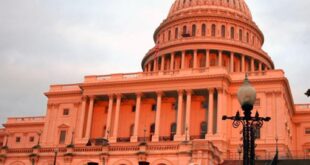Among the impoverished Iraqi refugees queuing for food aid at a Catholic charity in Damascus stands 65-year-old Hirmiz Hanna, puzzled and upset at his fate.Now retired, he worked all his life at the state oil company in Kirkuk. His wife and three children have university degrees.
The Christian family was relatively well off until death threats forced them to abandon their home and flee to Syria a year ago.
“I’ve come here to get some assistance, some food. Anything will do, it will help,†Hanna said in fluent English. The centre run by the Caritas relief agency had offered him food vouchers worth 1,500 Syrian pounds ($30) a month for six months.
“But for how long do we stay here? We can’t go back to Iraq. We’ll be killed en route,†he said, waiting in jacket and tie at a church annex in the shabby Jaramana area, swamped with Iraqis.
Syria says it now hosts 1.4 million Iraqi “guests†who have fled the relentless violence unleashed by the US-led invasion that toppled Iraqi leader Saddam Hussein in 2003.
“We expected to live freely like the rest of the world after the liberation, or invasion, but unfortunately it turned out the other way round. We wanted freedom, but we didn’t want it that way,†said Hanna. “Now we need to leave Syria, to emigrate.†But the West’s doors are largely closed to Iraqi refugees, while Syria and Jordan, the main host countries, are finding the strain on their own limited resources increasingly irksome.
Survival sex
Middle-class Iraqis like Hanna face the creeping humiliation of poverty as the savings they brought with them are exhausted.
Many of their poorer compatriots are already desperate. Some have even resorted to prostitution, despite the shame attached.
“We are defining it as survival sex,†said Sybella Wilkes, spokeswoman for the UN High Commissioner for Refugees (UNHCR).
“If these families had any other option, they wouldn’t put their girls, their daughters, sisters, into commercial sex.†She said a programme to identify and help such families was still in the planning stages, although UNHCR was supporting a small shelter for women victims run by nuns in Damascus.
Iraqis are still streaming over the Syrian border, sometimes at a rate of 1,000 a day, each bringing tales of the misery, sectarian bloodshed and insecurity that have uprooted them.
At a UNHCR registration centre near Damascus, a man who gave his name as Adnan, 25, said he had fled Iraq two days earlier.
“I worked for the police in Mosul. The terrorists couldn’t get me so they went for my brother. They killed him with eight bullets,†he said, his blue eyes shifting nervously around him.
“He has a wife and two children, but they just shot him in the street,†said Adnan, who is of mixed Arab-Kurdish parentage.
Thin and pale, he described how a suicide bomber had struck on his first day at the police station. “It broke everything.
Eight of my friends were killed. Some were cut in half.†Another brother still works for Iraqi television in Mosul, despite death threats. “He can’t leave his job,†Adnan said.
His mother and sisters have left the northern city for the relative safety of Dohuk, in Iraqi Kurdistan.
“It’s okay for me in Syria, but I have no money and I can’t help my family,†Adnan said. “I’m worried about my brother, about my family. I’m worried about all Iraqi people.â€
Calming fears
Only about 88,000 Iraqi refugees in Syria have registered with UNHCR, including more than 11,000 needing special protection because they have suffered violence or torture.
“We aren’t telling everyone they must get registered. It’s not going to affect their residence or get them a work permit — we say all Iraqis should have the right to stay and not to be forcibly returned to Iraq,†Wilkes said.
“But it helps us to identify those that need our help and it makes many Iraqis feel safer to be recognised and registered with UNHCR,†she added.
One such is Rafi Al Ani, 56, who has lived in Syria since 2001, when he moved here from the western Iraqi city of Ramadi to run a business exporting laboratory equipment to Iraq.
Now he fears his residence permit might not be renewed and he has come for an appointment with UNHCR.
“This is the first time I register as a refugee. I feel humiliated, it’s like begging somehow,†Ani confided.
Without work for several years, Ani has survived by buying and selling houses in Damascus. But his capital is dwindling.
“If it was safe, I would go back to Iraq tomorrow. We have a house directly on the Euphrates with a nice view. Here we live in a small, dirty flat. We’re not used to living like this.â€
 Eurasia Press & News
Eurasia Press & News



